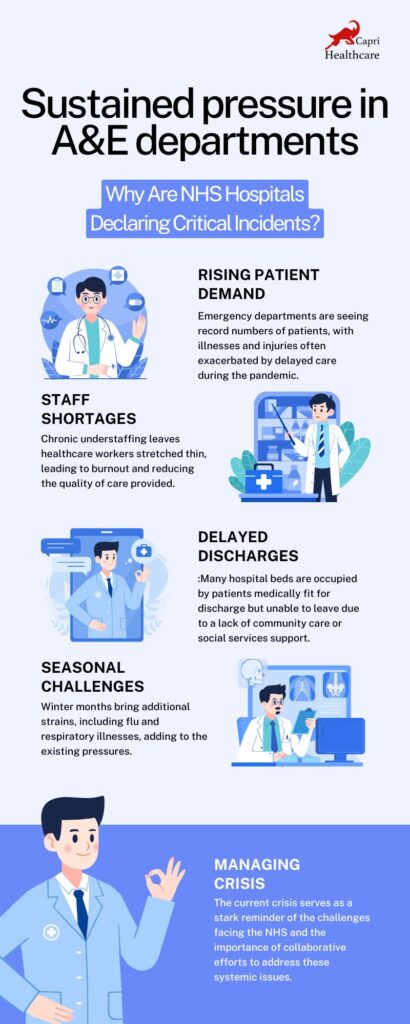Why Are NHS Hospitals Declaring Critical Incidents?
NHS hospitals in the UK are increasingly declaring critical incidents, signaling significant pressures within the healthcare system. A critical incident highlights the point at which hospitals struggle to maintain safe and effective patient care. This trend reflects broader systemic challenges that affect patients, healthcare staff, and overall service delivery.
What Is a Critical Incident in the NHS?
A critical incident is declared when a hospital’s resources are stretched to the limit. It occurs when patient safety is at risk due to factors like overcrowded emergency departments, staffing shortages, or limited bed availability. Once declared, hospitals can take measures such as redirecting resources, postponing non-urgent treatments, and seeking external support. While this status helps manage immediate crises, it also underlines the fragility of the healthcare system.
Key Reasons for Critical Incidents
1. Increasing Patient Demand
One of the main drivers of critical incidents is the rising demand for healthcare services. Emergency departments are seeing unprecedented patient numbers, with many presenting more complex needs. Delays in care during the COVID-19 pandemic have caused a backlog of untreated conditions, leading to increased hospital admissions. Chronic illnesses and aging populations further exacerbate this issue.
2. Chronic Staff Shortages
Staffing challenges have long plagued the NHS. A shortage of healthcare professionals means fewer hands on deck to manage patient care. This leads to longer waiting times, overworked staff, and reduced quality of service. Furthermore, burnout among healthcare workers is growing, contributing to high turnover rates and making recruitment difficult.
3. Delayed Discharges
Delayed discharges—sometimes called “bed blocking”—pose another significant issue. Many patients remain in hospital beds despite being medically fit for discharge because of a lack of social care or community support services. This reduces bed availability for new patients and creates bottlenecks in care delivery.
4. Seasonal Strains
The NHS faces additional pressure during winter months when illnesses like influenza and respiratory conditions surge. Seasonal challenges strain already stretched resources, pushing hospitals closer to critical thresholds.

The Impact on Patient Care
Declaring a critical incident can have far-reaching consequences for patient care. Emergency cases are prioritised, but non-urgent surgeries and treatments are delayed, leaving patients waiting longer for care. This can worsen health outcomes, particularly for those with chronic conditions or time-sensitive health needs.
Hospitals may also need to transfer patients to other facilities with capacity, creating additional stress for patients and their families. For healthcare workers, operating under critical incident conditions often leads to increased workloads and emotional strain.
The Broader Systemic Challenges
The frequency of critical incidents points to deeper systemic issues within the NHS. Funding constraints, outdated infrastructure, and fragmented social care systems all contribute to the problem. These challenges are not new but have been exacerbated by the pandemic and the increasing complexity of healthcare demands.
What Needs to Change?
Addressing critical incidents requires long-term solutions and significant investment. Key steps include:
- Adopting Technology: Innovative solutions like AI-driven patient management and digital triaging can improve efficiency.
- Expanding Workforce Capacity: Increased recruitment and retention efforts, better pay, and improved working conditions are essential.
- Improving Community Care: Strengthening social care services can help reduce delayed discharges and free up hospital beds.
- Boosting Funding: Additional resources are needed to modernise infrastructure and expand hospital capacity.
Collaboration between policymakers, healthcare providers, and community organisations is crucial for these changes to succeed.
– Krishna Thakur, Founder
The rise in critical incidents within NHS hospitals is a symptom of a system under immense strain. While declaring a critical incident helps manage immediate challenges, it is not a sustainable solution. Urgent reforms in staffing, funding, and community care are necessary to ensure the NHS can continue to deliver high-quality care. The time to act is now, as the health and well-being of millions depend on it.
[Source: https://news.sky.com/story/why-are-nhs-hospitals-declaring-critical-incidents-13285504]


